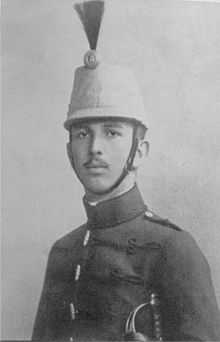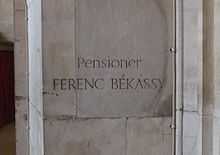Ferenc Békássy
| Ferenc Békássy | |
|---|---|
 Békássy in uniform | |
| Born |
7 April 1893 Zsennye |
| Died |
22 June 1915 (aged 22) near Chernivtsi |
| Nationality | Hungarian |
| Alma mater | King’s College, Cambridge |
| Genre | Poetry |
| Relatives |
Father: Istvan Békássy Mother: Emma Bezeredj |


Ferenc Istvan Dénes Gyula Békássy (7 April 1893 – 22 June 1915) was a Hungarian poet killed in World War I.
He was born in the family mansion at Zsennye in Vas County, western Hungary. He and his five siblings were sent to Bedales School for a progressive English education.[1]
After six years at Bedales, he entered King’s College, Cambridge in 1911 to read History. At Cambridge University his friends included James Strachey, E. L. Grant Watson and especially John Maynard Keynes, who went to stay with him in Hungary during the summer. He was elected a member of the Cambridge Apostles, the semi-secret debating club.[2] He and Rupert Brooke courted the same woman, Noël Olivier, whom Békássy had known from Bedales.[3]
He wrote poetry in both Hungarian and in English. Some of his English poems appeared in a Cambridge anthology in 1913. The Hungarian poems were only published posthumously.[3]
When war was imminent, with the assistance of Keynes,[4][5] he returned to Austro-Hungary to enlist. He served in a Hussar unit and four days after arriving on the Eastern Front, he was killed in action against the Russians at Dobrovouc in Bukovina on 22 June 1915.[6] His body was brought back to the family estate for burial.[7]
In a side chapel at King's College Chapel there is a plaque commemorating members of the college killed serving in the Great War, including Rupert Brooke. Carved into the stone of another wall there is a single name, that of Békássy. Keynes had asked the college to include him among those commemorated but another of the Fellows of King’s, who had lost a son in the war, objected to the name of someone who had died fighting the Allies being listed with the other fallen.[3]
A collection of his poems in English, edited by F. L. Lucas, was published in 1925 by Leonard and Virginia Woolf's Hogarth Press.[8]
Works
- Ferenc Bekassy: Adriatica and other poems; a selection, with preface (Hogarth Press, 1925)
- Békássy Ferenc egybegyűjtött írásai; edited by Tibor Weiner Sennyey (Budapest, 2010)
References
- ↑ Kenneth McRobbie, "Under the Sign of the pendulum: Childhood Experience as Determining Revolutionary Consciousness. Ilona Duczynska Polanyi", Canadian Journal of History, Autumn 2006
- ↑ William C. Lubenow, The Cambridge Apostles, 1820-1914
- ↑ 3.0 3.1 3.2 Hungarian Quarterly; Vol. LI, No. 199, Autumn 2010
- ↑ Paul Levy, The Bloomsbury Group
- ↑ Milo Keynes, Essays on John Maynard Keynes, p. 67
- ↑ Michael Copp, Cambridge Poets of the Great War: An Anthology, p. 236
- ↑ "Zsennye" (in Hungarian)
- ↑ John H. Willis, Leonard and Virginia Woolf as Publishers: The Hogarth Press, 1917-41, p. 141